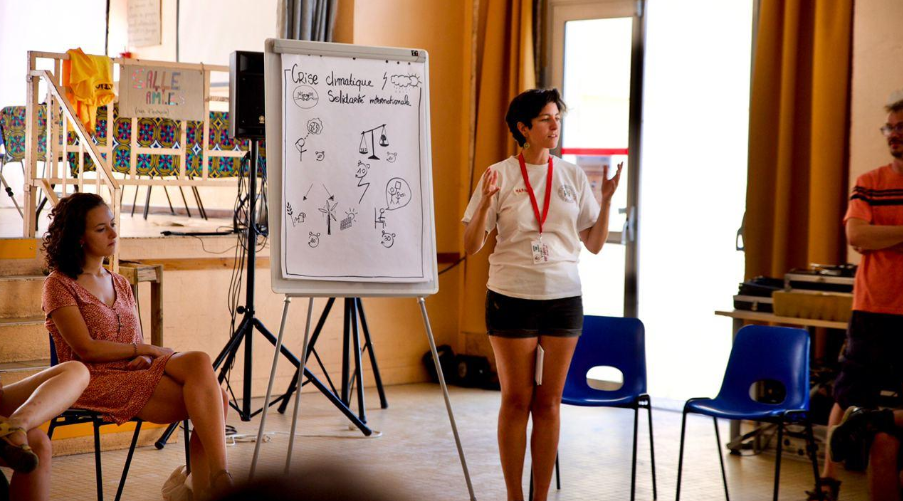Article by PBI-Canada

Photos by Antoine Mermet.
On August 21, ANV COP21 Besançon tweeted: “’Climate crisis and international solidarity’ was the workshop led by @PBIFrance: 2h30 on #humanrights, food sovereignty and #extractivism. Heavy debates! #CampClimat.”
ANV COP21 refers to Non-Violent Action COP21, a movement founded in 2015 to carry out non-violent actions before, during and after the 21st United Nations Conference of Parties (COP) climate summit in Paris in December of that year.
It has been referred to as the “resistance” or direct-action branch of Alternatiba (alternatives in Basque), that works on proposing solutions to the climate crisis.
ANV COP21 and Alternatiba may be best known for their months-long civil disobedience campaign last year that involved removing portraits of the President of the French Republic from city halls across the country and then marching with them – held upside down – at the G7 summit in Biarritz, France in August 2019.
On August 22, Alternatiba tweeted: “Citizens are already preparing the back-to-school mobilizations: 19 #CampClimat2020 take place all over the country, including 9 this weekend: Doubs-Jura, Toulouse, Nantes, Strasbourg, Touraine, Nord, PACA, Nancy and Rennes.”
PBI-France participated in the Doubs-Jura training.
maCommune.info reports: “From 20 to 23 August, the Camp Climat Doubs Jura took place in Port-Lesney, a camp for ‘training in the strategy of non-violent struggle for climate and social justice’. More than 140 people attended the conferences, and various workshops offered by the organizers ANV COP 21 Besançon and Alternatiba Besançon.”
Port-Lesney is a commune (township) in the Jura department (province) in eastern France, situated about 400 kilometres south-east of Paris. In turn, Besançon is located about 40 kilometres north of Port-Lesney.
At least three of the eleven founders of PBI (including Charles Walker, Lee Stern and Gene Keyes) who were at the August-September 1981 meeting on unceded Algonquin territory (south of Ottawa, Ontario, Canada) that first established the organization had previously spent time in prison for participating in non-violent direct actions.
Furthermore, George Willoughby, who sent the invitation letter for the founding meeting and who remained a key figure in the organization for the following decade, had previously sailed a boat onto the South Pacific to stop the US Navy from testing an atomic bomb. He and other crew members were sentenced to 60 days in jail for that action.
Notably, it is said that his action inspired the formation of Greenpeace and the Sea Shepherd Conservation Society years later on the lands of the Squamish, Tsleil-Waututh and Musqueam peoples (Vancouver, British Columbia, Canada).
Given the past experiences of the founders of PBI, it’s likely not surprising that our founding statement noted: “We are building on a rich and extensive heritage of nonviolent action, which no longer can be ignored.”
The next United Nations climate summit, COP26, is now scheduled to take place November 1-21, 2021 in Glasgow, Scotland. The summit was to take place in November of this year but was postponed due to the COVID-19 pandemic.
COP26 is being seen as a significant moment because it marks the 5+ anniversary of the signing of the Paris agreement and countries are expected to present their next round of commitments to reduce their carbon emissions.
Photo by maCommune.info.

Photos by Antoine Mermet.

